- Home
- P. G. Wodehouse
The Swoop: How Clarence Saved England (Forgotten Books) Page 5
The Swoop: How Clarence Saved England (Forgotten Books) Read online
Page 5
The Grand Duke swiftly added that eminent cleric to the list.
"Did you put that paper on this looking-glass?" he shouted.
"I did not put that paper on that looking-glass," replied Clarence precisely.
"Ah," said the Grand Duke, "if you had, I'd have come and wrung your neck like a chicken, and scattered you to the four corners of this dressing-room."
"I'm glad I didn't," said Clarence.
"Have you read this paper on the looking-glass?"
"I have not read that paper on the looking-glass," replied Clarence, whose chief fault as a conversationalist was that he was perhaps a shade too Ollendorfian. "But I know its contents."
"It's a lie!" roared the Grand Duke. "An infamous lie! I've a good mind to have him up for libel. I know very well he got them to put those paragraphs in, if he didn't write them himself."
"Professional jealousy," said Clarence, with a sigh, "is a very sad thing."
"I'll professional jealousy him!"
"I hear," said Clarence casually, "that he has been going very well at the Lobelia. A friend of mine who was there last night told me he took eleven calls."
For a moment the Russian General's face swelled apoplectically. Then he recovered himself with a tremendous effort.
"Wait!" he said, with awful calm. "Wait till to-morrow night! I'll show him! Went very well, did he? Ha! Took eleven calls, did he? Oh, ha, ha! And he'll take them to-morrow night, too! Only"—and here his voice took on a note of fiendish purpose so terrible that, hardened scout as he was, Clarence felt his flesh creep—"only this time they'll be catcalls!"
And, with a shout of almost maniac laughter, the jealous artiste flung himself into a chair, and began to pull off his boots.
Clarence silently withdrew. The hour was very near.
Chapter 7 - The Bird
*
The Grand Duke Vodkakoff was not the man to let the grass grow under his feet. He was no lobster, no flat-fish. He did it now—swift, secret, deadly—a typical Muscovite. By midnight his staff had their orders.
Those orders were for the stalls at the Lobelia.
Price of entrance to the gallery and pit was served out at daybreak to the Eighth and Fifteenth Cossacks of the Don, those fierce, semi-civilised fighting-machines who know no fear.
Grand Duke Vodkakoff's preparations were ready.
*
Few more fortunate events have occurred in the history of English literature than the quite accidental visit of Mr. Bart Kennedy to the Lobelia on that historic night. He happened to turn in there casually after dinner, and was thus enabled to see the whole thing from start to finish. At a quarter to eleven a wild-eyed man charged in at the main entrance of Carmelite House, and, too impatient to use the lift, dashed up the stairs, shouting for pens, ink and paper.
Next morning the Daily Mail was one riot of headlines. The whole of page five was given up to the topic. The headlines were not elusive. They flung the facts at the reader:—
SCENE AT THE LOBELIA
PRINCE OTTO OF SAXE-PFENNIG
GIVEN THE BIRD BY
RUSSIAN SOLDIERS
WHAT WILL BE THE OUTCOME?
There were about seventeen more, and then came Mr. Bart Kennedy's special report.
He wrote as follows:—
"A night to remember. A marvellous night. A night such as few will see again. A night of fear and wonder. The night of September the eleventh. Last night.
"Nine-thirty. I had dined. I had eaten my dinner. My dinner! So inextricably are the prose and romance of life blended. My dinner! I had eaten my dinner on this night. This wonderful night. This night of September the eleventh. Last night!
"I had dined at the club. A chop. A boiled potato. Mushrooms on toast. A touch of Stilton. Half-a-bottle of Beaune. I lay back in my chair. I debated within myself. A Hall? A theatre? A book in the library? That night, the night of September the eleventh, I as near as a toucher spent in the library of my club with a book. That night! The night of September the eleventh. Last night!
"Fate took me to the Lobelia. Fate! We are its toys. Its footballs. We are the footballs of Fate. Fate might have sent me to the Gaiety. Fate took me to the Lobelia. This Fate which rules us.
"I sent in my card to the manager. He let me through. Ever courteous. He let me through on my face. This manager. This genial and courteous manager.
"I was in the Lobelia. A dead-head. I was in the Lobelia as a dead-head!"
Here, in the original draft of the article, there are reflections, at some length, on the interior decorations of the Hall, and an excursus on music-hall performances in general. It is not till he comes to examine the audience that Mr. Kennedy returns to the main issue.
"And what manner of audience was it that had gathered together to view the entertainment provided by the genial and courteous manager of the Lobelia? The audience. Beyond whom there is no appeal. The Caesars of the music-hall. The audience."
At this point the author has a few extremely interesting and thoughtful remarks on the subject of audiences. These may be omitted. "In the stalls I noted a solid body of Russian officers. These soldiers from the Steppes. These bearded men. These Russians. They sat silent and watchful. They applauded little. The programme left them cold. The Trick Cyclist. The Dashing Soubrette and Idol of Belgravia. The Argumentative College Chums. The Swell Comedian. The Man with the Performing Canaries. None of these could rouse them. They were waiting. Waiting. Waiting tensely. Every muscle taut. Husbanding their strength. Waiting. For what?
"A man at my side told a friend that a fellow had told him that he had been told by a commissionaire that the pit and gallery were full of Russians. Russians. Russians everywhere. Why? Were they genuine patrons of the Halls? Or were they there from some ulterior motive? There was an air of suspense. We were all waiting. Waiting. For what?
"The atmosphere is summed up in a word. One word. Sinister. The atmosphere was sinister.
"AA! A stir in the crowded house. The ruffling of the face of the sea before a storm. The Sisters Sigsbee, Coon Delineators and Unrivalled Burlesque Artists, have finished their dance, smiled, blown kisses, skipped off, skipped on again, smiled, blown more kisses, and disappeared. A long chord from the orchestra. A chord that is almost a wail. A wail of regret for that which is past. Two liveried menials appear. They carry sheets of cardboard. These menials carry sheets of cardboard. But not blank sheets. On each sheet is a number.
"The number 15.
"Who is number 15?
"Prince Otto of Saxe-Pfennig. Prince Otto, General of the German Army. Prince Otto is Number 15.
"A burst of applause from the house. But not from the Russians. They are silent. They are waiting. For what?
"The orchestra plays a lively air. The massive curtains part. A tall, handsome military figure strides on to the stage. He bows. This tall, handsome, military man bows. He is Prince Otto of Saxe-Pfennig, General of the Army of Germany. One of our conquerors.
"He begins to speak. 'Ladies and gentlemen.' This man, this general, says, 'Ladies and gentlemen.'
"But no more. No more. No more. Nothing more. No more. He says, 'Ladies and Gentlemen,' but no more.
"And why does he say no more? Has he finished his turn? Is that all he does? Are his eight hundred and seventy-five pounds a week paid him for saying, 'Ladies and Gentlemen'?
"No!
"He would say more. He has more to say. This is only the beginning. This tall, handsome man has all his music still within him.
"Why, then, does he say no more? Why does he say 'Ladies and Gentlemen,' but no more? No more. Only that. No more. Nothing more. No more.
"Because from the stalls a solid, vast, crushing 'Boo!' is hurled at him. From the Russians in the stalls comes this vast, crushing 'Boo!' It is for this that they have been waiting. It is for this that they have been waiting so tensely. For this. They have been waiting for this colossal 'Boo!'
"The General retreats a step. He is amazed. Startled. Perhaps frigh
tened. He waves his hands.
"From gallery and pit comes a hideous whistling and howling. The noise of wild beasts. The noise of exploding boilers. The noise of a music-hall audience giving a performer the bird.
"Everyone is standing on his feet. Some on mine. Everyone is shouting. This vast audience is shouting.
"Words begin to emerge from the babel.
"'Get offski! Rotten turnovitch!' These bearded Russians, these stern critics, shout, 'Rotten turnovitch!'
"Fire shoots from the eyes of the German. This strong man's eyes.
"'Get offski! Swankietoff! Rotten turnovitch!'
"The fury of this audience is terrible. This audience. This last court of appeal. This audience in its fury is terrible.
"What will happen? The German stands his ground. This man of blood and iron stands his ground. He means to go on. This strong man. He means to go on if it snows.
"The audience is pulling up the benches. A tomato shatters itself on the Prince's right eye. An over-ripe tomato.
"'Get offski!' Three eggs and a cat sail through the air. Falling short, they drop on to the orchestra. These eggs! This cat! They fall on the conductor and the second trombone. They fall like the gentle dew from Heaven upon the place beneath. That cat! Those eggs!
"AA! At last the stage-manager—keen, alert, resourceful—saves the situation. This man. This stage-manager. This man with the big brain. Slowly, inevitably, the fireproof curtain falls. It is half-way down. It is down. Before it, the audience. The audience. Behind it, the Prince. The Prince. That general. That man of iron. That performer who has just got the bird.
"The Russian National Anthem rings through the hall. Thunderous! Triumphant! The Russian National Anthem. A paean of joy.
"The menials reappear. Those calm, passionless menials. They remove the number fifteen. They insert the number sixteen. They are like Destiny— Pitiless, Unmoved, Purposeful, Silent. Those menials.
"A crash from the orchestra. Turn number sixteen has begun...."
Chapter 8 - The Meeting at the Scotch Stores
*
Prince Otto of Saxe-Pfennig stood in the wings, shaking in every limb. German oaths of indescribable vigour poured from his lips. In a group some feet away stood six muscular, short-sleeved stage-hands. It was they who had flung themselves on the general at the fall of the iron curtain and prevented him dashing round to attack the stalls with his sabre. At a sign from the stage-manager they were ready to do it again.
The stage-manager was endeavouring to administer balm.
"Bless you, your Highness," he was saying, "it's nothing. It's what happens to everyone some time. Ask any of the top-notch pros. Ask 'em whether they never got the bird when they were starting. Why, even now some of the biggest stars can't go to some towns because they always cop it there. Bless you, it—"
A stage-hand came up with a piece of paper in his hand.
"Young feller in spectacles and a rum sort o' suit give me this for your 'Ighness."
The Prince snatched it from his hand.
The note was written in a round, boyish hand. It was signed, "A Friend." It ran:—"The men who booed you to-night were sent for that purpose by General Vodkakoff, who is jealous of you because of the paragraphs in the Encore this week."
Prince Otto became suddenly calm.
"Excuse me, your Highness," said the stage-manager anxiously, as he moved, "you can't go round to the front. Stand by, Bill."
"Right, sir!" said the stage-hands.
Prince Otto smiled pleasantly.
"There is no danger. I do not intend to go to the front. I am going to look in at the Scotch Stores for a moment."
"Oh, in that case, your Highness, good-night, your Highness! Better luck to-morrow, your Highness!"
*
It had been the custom of the two generals, since they had joined the music-hall profession, to go, after their turn, to the Scotch Stores, where they stood talking and blocking the gangway, as etiquette demands that a successful artiste shall.
The Prince had little doubt but that he would find Vodkakoff there to-night.
He was right. The Russian general was there, chatting affably across the counter about the weather.
He nodded at the Prince with a well-assumed carelessness.
"Go well to-night?" he inquired casually.
Prince Otto clenched his fists; but he had had a rigorously diplomatic up-bringing, and knew how to keep a hold on himself. When he spoke it was in the familiar language of diplomacy.
"The rain has stopped," he said, "but the pavements are still wet underfoot. Has your grace taken the precaution to come out in a good stout pair of boots?"
The shaft plainly went home, but the Grand Duke's manner, as he replied, was unruffled.
"Rain," he said, sipping his vermouth, "is always wet; but sometimes it is cold as well."
"But it never falls upwards," said the Prince, pointedly.
"Rarely, I understand. Your powers of observation are keen, my dear Prince."
There was a silence; then the Prince, momentarily baffled, returned to the attack.
"The quickest way to get from Charing Cross to Hammersmith Broadway," he said, "is to go by Underground."
"Men have died in Hammersmith Broadway," replied the Grand Duke suavely.
The Prince gritted his teeth. He was no match for his slippery adversary in a diplomatic dialogue, and he knew it.
"The sun rises in the East," he cried, half-choking, "but it sets—it sets!"
"So does a hen," was the cynical reply.
The last remnants of the Prince's self-control were slipping away. This elusive, diplomatic conversation is a terrible strain if one is not in the mood for it. Its proper setting is the gay, glittering ball-room at some frivolous court. To a man who has just got the bird at a music-hall, and who is trying to induce another man to confess that the thing was his doing, it is little short of maddening.
"Hen!" he echoed, clenching and unclenching his fists. "Have you studied the habits of hens?"
The truth seemed very near to him now, but the master-diplomat before him was used to extracting himself from awkward corners.
"Pullets with a southern exposure," he drawled, "have yellow legs and ripen quickest."
The Prince was nonplussed. He had no answer.
The girl behind the bar spoke.
"You do talk silly, you two!" she said.
It was enough. Trivial as the remark was, it was the last straw. The Prince brought his fist down with a crash on the counter.
"Yes," he shouted, "you are right. We do talk silly; but we shall do so no longer. I am tired of this verbal fencing. A plain answer to a plain question. Did you or did you not send your troops to give me the bird to-night?"
"My dear Prince!"
The Grand Duke raised his eyebrows.
"Did you or did you not?"
"The wise man," said the Russian, still determined on evasion, "never takes sides, unless they are sides of bacon."
The Prince smashed a glass.
"You did!" he roared. "I know you did! Listen to me! I'll give you one chance. I'll give you and your precious soldiers twenty-four hours from midnight to-night to leave this country. If you are still here then—"
He paused dramatically.
The Grand Duke slowly drained his vermouth.
"Have you seen my professional advertisement in the Era, my dear Prince?" he asked.
"I have. What of it?"
"You noticed nothing about it?"
"I did not."
"Ah. If you had looked more closely, you would have seen the words, 'Permanent address, Hampstead.'"
"You mean—"
"I mean that I see no occasion to alter that advertisement in any way."
There was another tense silence. The two men looked hard at each other.
"That is your final decision?" said the German.
The Russian bowed.
"So be it," said the Prince, turning to the door. "I have
the honour to wish you a very good night."
"The same to you," said the Grand Duke. "Mind the step."
Chapter 9 - The Great Battle
*
The news that an open rupture had occurred between the Generals of the two invading armies was not slow in circulating. The early editions of the evening papers were full of it. A symposium of the opinions of Dr. Emil Reich, Dr. Saleeby, Sandow, Mr. Chiozza Money, and Lady Grove was hastily collected. Young men with knobbly and bulging foreheads were turned on by their editors to write character-sketches of the two generals. All was stir and activity.
Meanwhile, those who look after London's public amusements were busy with telephone and telegraph. The quarrel had taken place on Friday night. It was probable that, unless steps were taken, the battle would begin early on Saturday. Which, it did not require a man of unusual intelligence to see, would mean a heavy financial loss to those who supplied London with its Saturday afternoon amusements. The matinees would suffer. The battle might not affect the stalls and dress-circle, perhaps, but there could be no possible doubt that the pit and gallery receipts would fall off terribly. To the public which supports the pit and gallery of a theatre there is an irresistible attraction about a fight on anything like a large scale. When one considers that a quite ordinary street-fight will attract hundreds of spectators, it will be plainly seen that no theatrical entertainment could hope to compete against so strong a counter-attraction as a battle between the German and Russian armies.
The various football-grounds would be heavily hit, too. And there was to be a monster roller-skating carnival at Olympia. That also would be spoiled.
A deputation of amusement-caterers hurried to the two camps within an hour of the appearance of the first evening paper. They put their case plainly and well. The Generals were obviously impressed. Messages passed and repassed between the two armies, and in the end it was decided to put off the outbreak of hostilities till Monday morning.
*
Satisfactory as this undoubtedly was for the theatre-managers and directors of football clubs, it was in some ways a pity. From the standpoint of the historian it spoiled the whole affair. But for the postponement, readers of this history might—nay, would—have been able to absorb a vivid and masterly account of the great struggle, with a careful description of the tactics by which victory was achieved. They would have been told the disposition of the various regiments, the stratagems, the dashing advances, the skilful retreats, and the Lessons of the War.

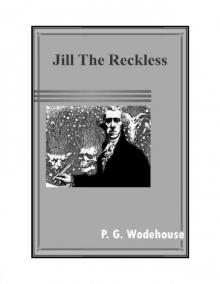 Jill the Reckless
Jill the Reckless Uncle Fred in the Springtime
Uncle Fred in the Springtime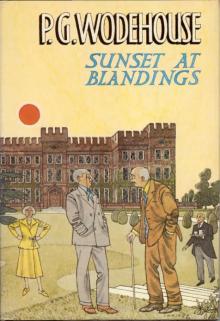 Sunset at Blandings
Sunset at Blandings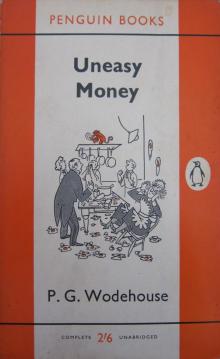 Uneasy Money
Uneasy Money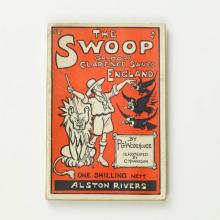 The Swoop! or, How Clarence Saved England: A Tale of the Great Invasion
The Swoop! or, How Clarence Saved England: A Tale of the Great Invasion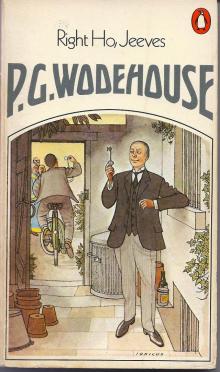 Right Ho, Jeeves
Right Ho, Jeeves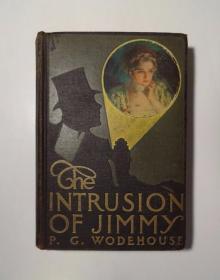 The Intrusion of Jimmy
The Intrusion of Jimmy The Jeeves Omnibus - Vol 1:
The Jeeves Omnibus - Vol 1: Aunts Aren't Gentlemen:
Aunts Aren't Gentlemen: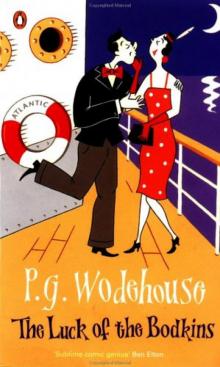 The Luck of the Bodkins
The Luck of the Bodkins The Little Nugget
The Little Nugget Money for Nothing
Money for Nothing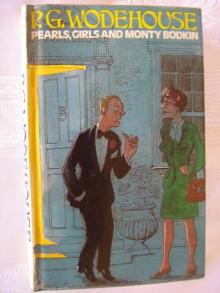 Pearls, Girls and Monty Bodkin
Pearls, Girls and Monty Bodkin Mulliner Nights
Mulliner Nights Blandings Castle and Elsewhere
Blandings Castle and Elsewhere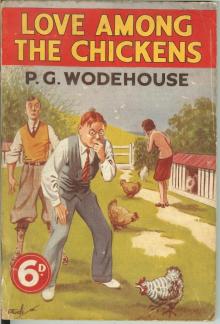 Love Among the Chickens
Love Among the Chickens Carry On, Jeeves!
Carry On, Jeeves!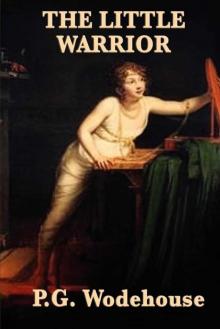 The Little Warrior
The Little Warrior Ice in the Bedroom
Ice in the Bedroom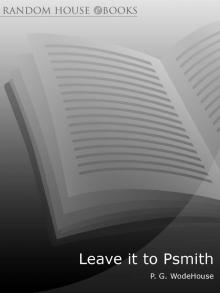 Leave It to Psmith
Leave It to Psmith Thank You, Jeeves:
Thank You, Jeeves: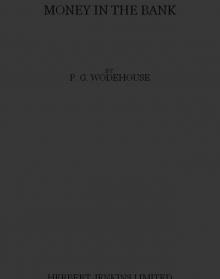 Money in the Bank
Money in the Bank The Man Upstairs and Other Stories
The Man Upstairs and Other Stories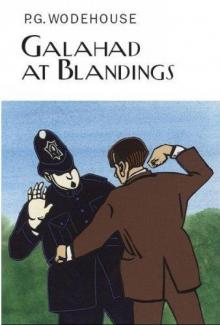 Galahad at Blandings
Galahad at Blandings The Jeeves Omnibus Vol. 5
The Jeeves Omnibus Vol. 5 Uncle Dynamite
Uncle Dynamite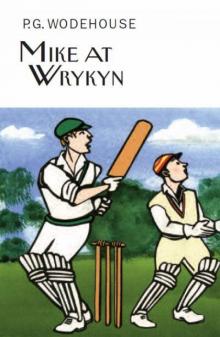 Mike at Wrykyn
Mike at Wrykyn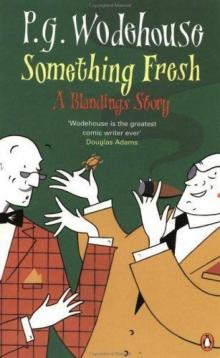 Something Fresh
Something Fresh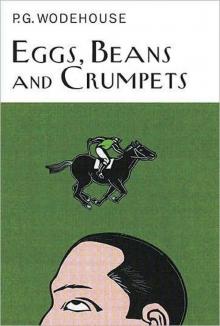 Eggs, Beans and Crumpets
Eggs, Beans and Crumpets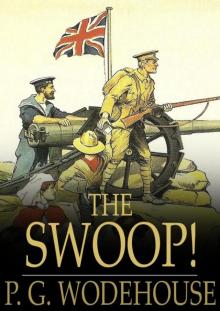 The Swoop: How Clarence Saved England (Forgotten Books)
The Swoop: How Clarence Saved England (Forgotten Books)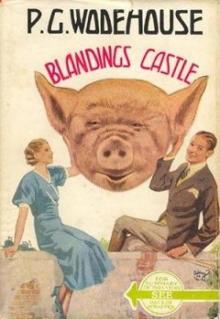 Blanding Castle Omnibus
Blanding Castle Omnibus Wodehouse at the Wicket: A Cricketing Anthology
Wodehouse at the Wicket: A Cricketing Anthology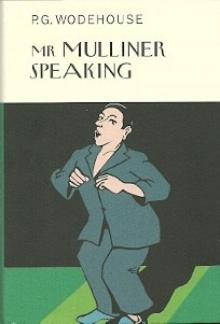 Mr. Mulliner Speaking
Mr. Mulliner Speaking Hot Water
Hot Water The Jeeves Omnibus - Vol 3: The Mating Season / Ring for Jeeves / Very Good, Jeeves
The Jeeves Omnibus - Vol 3: The Mating Season / Ring for Jeeves / Very Good, Jeeves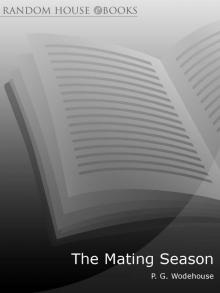 The Mating Season
The Mating Season Meet Mr. Mulliner
Meet Mr. Mulliner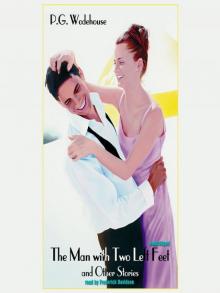 The Man with Two Left Feet, and Other Stories
The Man with Two Left Feet, and Other Stories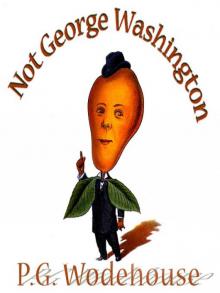 Not George Washington — an Autobiographical Novel
Not George Washington — an Autobiographical Novel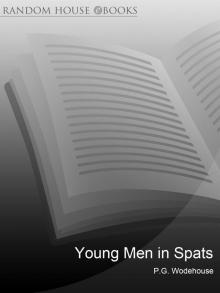 Young Men in Spats
Young Men in Spats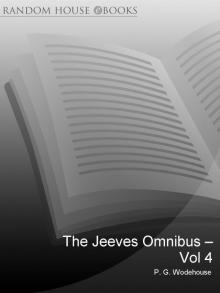 The Jeeves Omnibus Vol. 4
The Jeeves Omnibus Vol. 4 A Pelican at Blandings:
A Pelican at Blandings: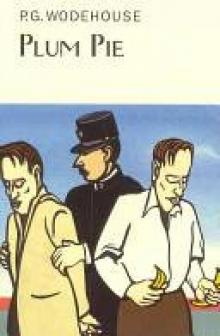 Plum Pie
Plum Pie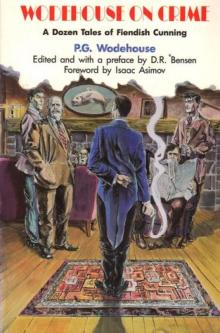 Wodehouse On Crime
Wodehouse On Crime The Jeeves Omnibus Vol. 2: Right Ho, Jeeves / Joy in the Morning / Carry On, Jeeves
The Jeeves Omnibus Vol. 2: Right Ho, Jeeves / Joy in the Morning / Carry On, Jeeves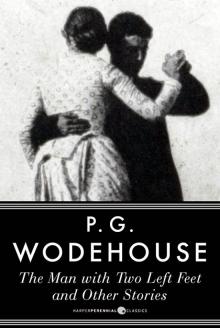 The Man With Two Left Feet
The Man With Two Left Feet Full Moon:
Full Moon: Jeeves and the Feudal Spirit:
Jeeves and the Feudal Spirit: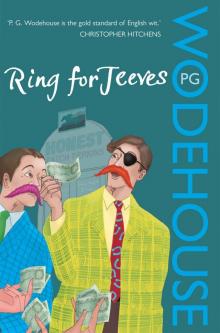 Ring For Jeeves
Ring For Jeeves Something New
Something New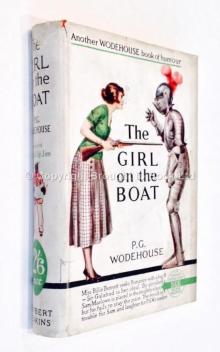 The Girl on the Boat
The Girl on the Boat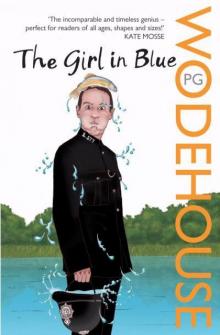 The Girl in Blue
The Girl in Blue Pigs Have Wings:
Pigs Have Wings: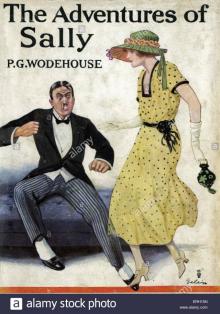 The Adventures of Sally
The Adventures of Sally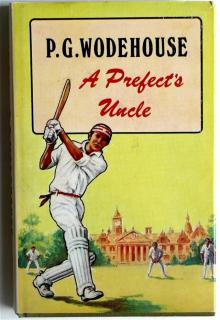 A Prefect's Uncle
A Prefect's Uncle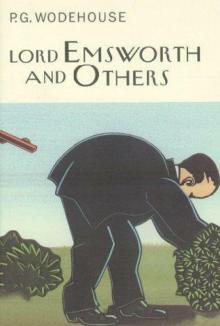 Lord Emsworth and Others
Lord Emsworth and Others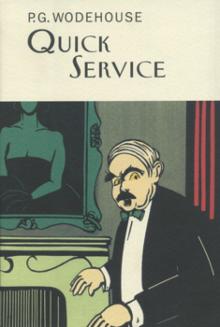 Quick Service
Quick Service The Prince and Betty
The Prince and Betty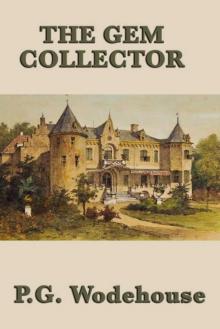 The Gem Collector
The Gem Collector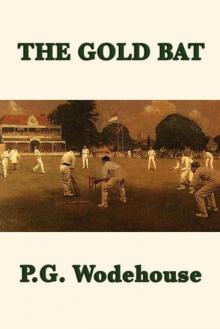 The Gold Bat
The Gold Bat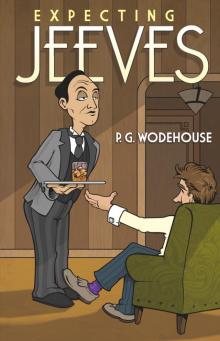 Expecting Jeeves
Expecting Jeeves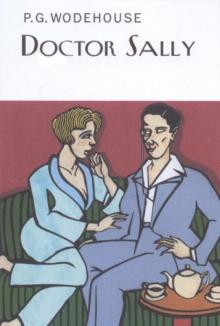 Doctor Sally
Doctor Sally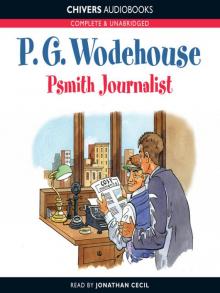 Psmith, Journalist
Psmith, Journalist The Golf Omnibus
The Golf Omnibus Heavy Weather
Heavy Weather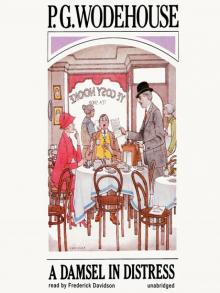 A Damsel in Distress
A Damsel in Distress The Coming of Bill
The Coming of Bill Summer Lightning
Summer Lightning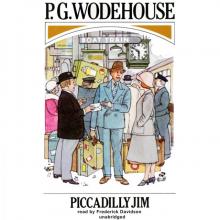 Piccadilly Jim
Piccadilly Jim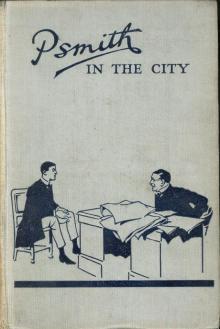 Psmith in the City
Psmith in the City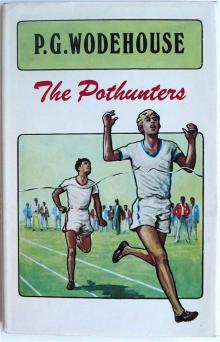 The Pothunters
The Pothunters Service With a Smile
Service With a Smile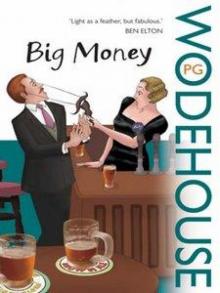 Big Money
Big Money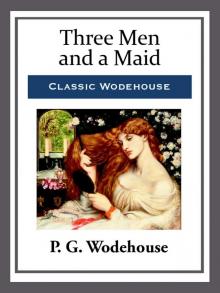 Three Men and a Maid
Three Men and a Maid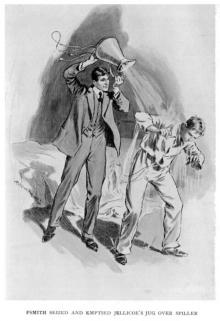 Mike and Psmith
Mike and Psmith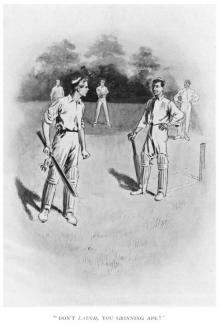 Mike
Mike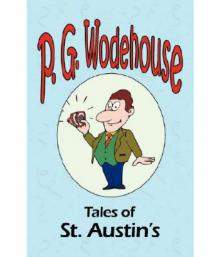 Tales of St. Austin's
Tales of St. Austin's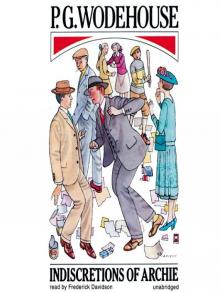 Indiscretions of Archie
Indiscretions of Archie Pigs Have Wings
Pigs Have Wings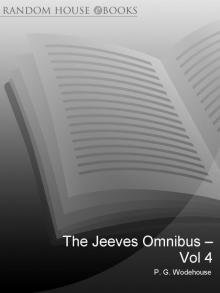 The Jeeves Omnibus - Vol 4: (Jeeves & Wooster): No.4
The Jeeves Omnibus - Vol 4: (Jeeves & Wooster): No.4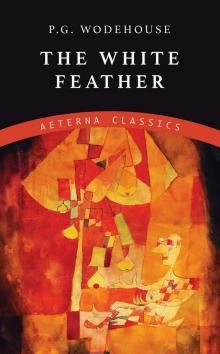 The White Feather
The White Feather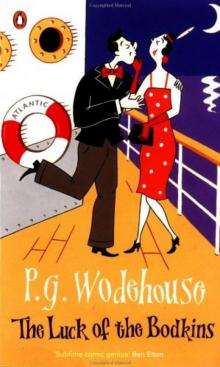 Luck of the Bodkins
Luck of the Bodkins THE SPRING SUIT
THE SPRING SUIT Full Moon
Full Moon Very Good, Jeeves
Very Good, Jeeves Thank You, Jeeves
Thank You, Jeeves Reginald's Record Knock.
Reginald's Record Knock. Wodehouse At the Wicket
Wodehouse At the Wicket LADIES AND GENTLEMEN V. PLAYERS
LADIES AND GENTLEMEN V. PLAYERS The Jeeves Omnibus - Vol 5: (Jeeves & Wooster)
The Jeeves Omnibus - Vol 5: (Jeeves & Wooster) The Jeeves Omnibus - Vol 1: (Jeeves & Wooster): No.1
The Jeeves Omnibus - Vol 1: (Jeeves & Wooster): No.1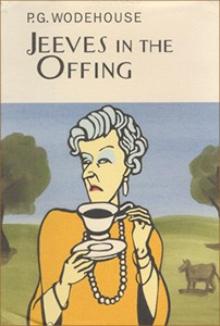 Jeeves in the offing jaw-12
Jeeves in the offing jaw-12